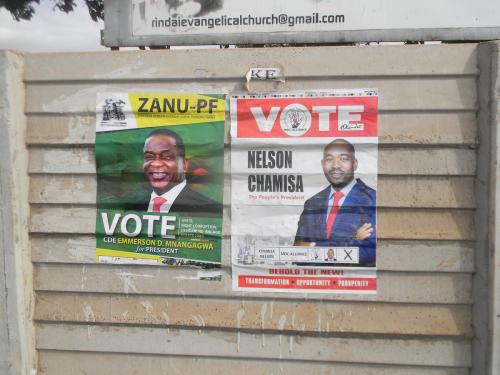

10:00 pm AST - 11:00 pm AST
Past Event
Content from the Brookings Doha Center is now archived. In September 2021, after 14 years of impactful partnership, Brookings and the Brookings Doha Center announced that they were ending their affiliation. The Brookings Doha Center is now the Middle East Council on Global Affairs, a separate public policy institution based in Qatar.
The Brookings Doha Center (BDC) held a webinar discussion on June 10, 2020 about the impact of the coronavirus pandemic on Chinese engagement in the Middle East and North Africa (MENA) region. In addition to the pandemic’s effects, panelists considered the reaction of the United States and European Union (EU) to China’s growing outreach. The panel consisted of a group of distinguished scholars and experts, including: Yahia H. Zoubir, visiting fellow at the BDC; Zeno Leoni, teaching fellow at King’s College London; Emilie Tran, course coordinator of European studies at Hong Kong Baptist University; and Degang Sun, professor at the Institute of International Studies at Fudan University. Adel Abdel Ghafar, fellow at the BDC, moderated the event.
Yahia H. Zoubir began the discussion, describing China’s relationship with MENA states before the pandemic as well as during. Firstly, he stated that Chinese regional engagement began with former President Hu Jintao (2003–2013), but has developed tremendously under current President Xi Jinping. China’s reasoning for looking to the Middle East may be identified within the array of documents put out by the government. For instance, China’s Arab Policy Paper of 2016 stated that the country hopes its engagement with the MENA region is mutually beneficial, and outlined areas of potential cooperation. One such area has proven to be that of energy, indeed, the country has become a net importer of energy and obtains a large portion of such imports from the Middle East. Moreover, infrastructure presents another area of cooperation as China has invested heavily in projects, such as ports and industrial parks, across the MENA region. Finally, Zoubir argued that the pandemic has only illuminated the depth of Sino-Arab relations. When COVID-19 began to spread across the world, most MENA states sent aid to China and maintained close communication with the country’s leadership.
Zeno Leoni continued the discussion, describing the United States’ reaction to China’s growing outreach in the MENA region. Firstly, he contended that the world is beholding a new Cold War between the two countries that has produced different dynamics in each region. For example, while U.S.-Chinese rivalry is relaxed in the MENA region, it is heightened in Europe and the western Pacific. Ultimately, the United States is threatened over China’s exploitation of the global economy and its challenge to U.S. primacy in several technological areas. Leoni noted that the United States has feared losing this technological competition with China as it will weaken U.S. global hegemony. Moreover, this dynamic has been further aggravated by China’s growing military presence in the western Pacific. Nonetheless, it is unlikely that the United States and China will engage in direct confrontation in the short term, as the two are highly interdependent. Regarding the Middle East in specific, while China is eroding U.S. interest in general, it has not yet threatened the country’s military hegemony. Instead, China has occupied spaces that the United States has left in the sectors of investment, energy security, and more. And because the two countries maintain separate domains, Leoni noted, they appear to tolerate each other.
Following Leoni’s comments, Emilie Tran described the impact of growing Chinese engagement on Europe’s role in the MENA region. Firstly, she noted that the EU remains the MENA region’s top trading partner. Nonetheless, the EU continues to follow an ineffective policy in the Middle East and this has allowed China to pursue its interests. Tran stated that “[China’s] economic presence is likely to have important consequences for European economic and security interests.” This is because China provides a model of non-democratic development to MENA regimes and has emerged as a crucial actor who can offer direct investment. Furthermore, there are many unknown elements in the potential security consequences of MENA countries’ acquisition of Chinese technology. That being said, the EU should not overestimate China’s presence in the Middle East. While the country seeks to project an image of itself as a new global power, at times this image is an over-exaggeration. For example, many of the projects proposed in the Middle East under the Belt and Road Initiative (BRI) have been abandoned or postponed. Finally, Tran noted that it would behoove European actors to cooperate with China in the Middle East as European states could provide China with their regional know-how, experience, and network in return for economic support.
Degang Sun concluded the discussion and identified the diplomatic objectives that China is pursuing during the post-COVID-19 era. Firstly, the country is seeking to revitalize commercial ties with MENA states and repair its image that has been harmed by the pandemic. Furthermore, the country is striving to uphold multilateralism and minimize U.S.-Chinese rivalry, which has led to a politicization of China’s economic role and harmed its financial endeavors in the region. Finally, Sun noted that China’s last objective will be to assert itself as a primary stakeholder in the Middle East’s security domain. In addition to the country’s diplomatic objectives, Sun outlined the ways that China has begun to restore its presence in the region. Firstly, China’s effective management of the pandemic has demonstrated the efficiency of its strong governance system and proved that national capacity is irrelevant to a state’s political system. Moreover, China seeks to monopolize on its economic statecraft to improve its relations with MENA countries and play a more prominent role in the domain of conflict mediation. Indeed, the Trump administration’s disengagement from the Middle East and favor of Israel may allow China to put forward its own peace initiatives for various regional conflicts.
In the subsequent question and answer session, panelists focused on China’s role in the Maghreb, the U.S. presidential elections, and the notion of “debt traps.” Zoubir contended that in the Maghreb, while many states are using China to balance their dependency on the EU, some countries do indeed favor China as a trading partner over European states. Moreover, Zeno stated that even if Joe Biden is elected in the upcoming U.S. presidential election, U.S.-Chinese rivalry will likely continue. Emile Tran noted that the EU, as a block, has consistently refused to join the BRI and even issued its own alternative development project connecting Europe and Asia. This demonstrates the union’s apprehension over Beijing’s global influence. Finally, Zoubir refuted the fact that China is setting “debt traps” on MENA countries. He explained that China is lenient on the amount that needs to be repaid by those nations who have taken out loans to fund infrastructure development.

Yingyi Ma, Ying Lin
July 14, 2025

Chipo Dendere, Miles Tendi
July 14, 2025

George Ingram, Anthony F. Pipa
July 10, 2025